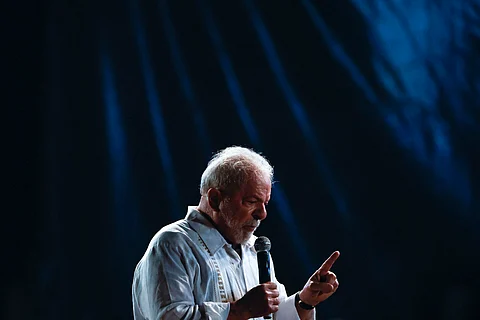

Brazilian President Luiz Inácio Lula da Silva has hit back at Donald Trump’s tariff threats, stating that the US president was elected to lead the United States — “not to be the emperor of the world.”
Trump, in a letter posted on his social media platform Truth Social last week, threatened to impose crippling tariffs of 50 percent on Brazilian imports starting August 1.
He linked the tariff move to what he described as a “witch hunt” trial against Brazil’s former right-wing president Jair Bolsonaro — a close ally of Trump — who is currently facing trial for allegedly attempting to overturn the result of Lula’s 2022 presidential election victory. If convicted of plotting a coup, Bolsonaro could face more than four decades in prison.
In an interview with CNN’s Christiane Amanpour on Thursday, Lula said Trump’s threats were outside the bounds of diplomatic protocol and insisted that Bolsonaro’s trial should not be entangled with trade negotiations.
“The judiciary in Brazil is independent. The president of the republic has no influence whatsoever,” he said. “Bolsonaro is not being judged personally; he is being judged for attempting to orchestrate a coup d’état.”
On Friday, Trump posted another letter — this time addressed to Bolsonaro — suggesting the former Brazilian leader was a victim of an “unjust system” and that he would be “watching closely.”
Lula remarked that had Trump carried out the Capitol Hill riot in Brazil, he too would be facing trial. “If Trump were Brazilian and did what he did at Capitol Hill, he’d be on trial here. It would be seen as a violation of the Constitution — and he would very likely be arrested,” Lula said.
Speaking through an interpreter, Lula expressed dismay over Trump’s rhetoric, saying he initially thought the social media post was fabricated. “It was very unpleasant,” he said. “I thought it was fake news.”
In response to the threat, Brazil has now vowed reciprocal tariffs if Trump follows through — marking one of the first direct international pushbacks against the former US president's protectionist stance in recent months.
“Brazil is here to look after Brazil and the Brazilian people — not the interests of others,” Lula asserted. “We will not accept anything imposed on us. We are open to negotiation, not imposition.”
Interestingly, unlike more than 20 other countries that received similar tariff warnings from Trump this month, the United States ran a trade surplus of $6.8 billion with Brazil in 2024 — meaning it exported more to Brazil than it imported.
Top US exports to Brazil last year included aircraft and spacecraft, fuels, industrial machinery such as nuclear reactors, and electrical equipment, according to data from the US Census Bureau. A retaliatory 50 per cent tariff on these goods could deal a significant blow to American manufacturers.
Despite the sharp words, Lula said he remains open to dialogue with Washington, stressing that it is now up to Trump to engage seriously with the process.
“I’m not a progressive president — I am the president of Brazil,” Lula said. “And I don’t see President Trump as a far-right leader. I see him as the president of the United States, elected by the American people.”
“The best thing in the world is for us to sit down at a table and talk,” he added. “If President Trump is willing to take seriously the negotiations underway between Brazil and the US, then I’ll be open-minded and ready to discuss whatever may be necessary. But the relationship between our two countries cannot continue like this.”
Meanwhile, on Tuesday, the United States escalated the row by launching a formal investigation into what it called Brazil’s “unfair” trade practices.
The probe, announced by the Office of the United States Trade Representative (USTR), will examine issues such as digital trade and payment systems, preferential tariffs, anti-corruption measures, and intellectual property protections, to determine whether Brazil’s policies are “unreasonable or discriminatory” and whether they place a burden on US trade.
The investigation will also explore ethanol market access and illegal deforestation.